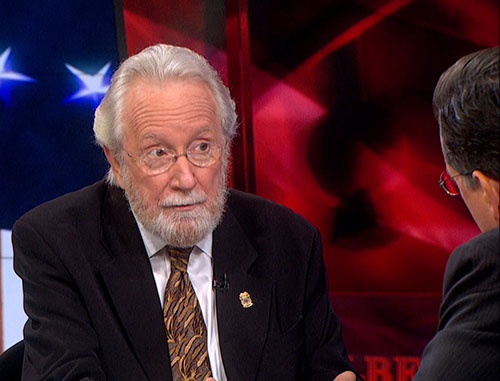PART 1: THE INTERVIEW
— by Lin McNulty —

Orcas Islander Norm Stamper being interviewed by Stephen Colbert.
A litany of victim names, dates, cities, as well as the names of shooters, effortlessly, yet painfully, roll off his tongue like so much harsh vinegar. Norm Stamper is passionate and concerned about how his former career has progressed into the current para-military state across the nation.
Following 34 years of service (culminating in positions as police chief in San Diego and Seattle), Stamper’s area of expertise, his passion, his life purpose is community policing.
In the weeks after the August 9, 2014 shooting of Michael Brown in Ferguson, Missouri, Stamper was called upon for more than 90 interviews by national and international media, including the BBC and Democracy Now with Amy Goodman. It was at this point that his publisher, Nation Books, contacted him to say, “we need you to do another book” that will address the growing increase in shootings (of unarmed black men) by (white) police officers. (Nation Books also published Stamper’s previous book, Breaking Rank: A Top Cop’s Exposé of the Dark Side of American Policing (August 2009).)
“Wars” between the police and the citizenry may have been ongoing in one form or another since the birth of our country; now, due to technology, white America is more aware of these activities. Stamper points out, “We now have new wars, new enemies,” Although this all began even before Nixon’s declaration of the War on Drugs, before the Twin Towers came down, these events were a huge impetus that has us speeding down an increasingly-rapid path.
“If we treat them like soldiers, weaponize them like soldiers,” he asserts, “they are are going to act like soldiers — and perceived as an occupational force.”
“If we treat them like soldiers, weaponize them like soldiers, they are are going to act like soldiers.”
There is not much question our police have become militarized, with the U.S. Government now granting both large and small police agencies virtually cost-free equipment designed for war. These agencies then feel compelled to use it or lose it. And with this increased fire power, attitudes of the police and citizenry are multiplied as the “us versus them” mindset grows daily on both sides.
With the attitude that “we’re the cops and you’re not,” the police are not only in charge, they are out of control. “The police in America belong to the people, not the other way round,” Stamper emphatically states.
“The police in America belong to the people, not the other way round.”
Community policing is the solution he offers. And although it is being “observed” by many police agencies, Stamper knows of nowhere you can go in this country to see the optimum community policing in practice.
Author and activist Norm Stamper told BBC that he resigned as Seattle’s police chief after the tear gas used on demonstrators at the 1999 World Trade Organization meeting caused a passive protest to turn violent. It was appalling to use tear gas on peaceful protestors, he says upon reflection.
“It was appalling to use tear gas on peaceful protestors.”
Following his retirement in June 2001, Stamper moved to Orcas, looking for a quiet place to write. With two published books now under his belt (To Protect and Serve: How to Fix America’s Police, Nation Books, 2016, a diagnosis of “the system,” and Breaking Rank: A Top Cop’s Exposé of the Dark Side of American Policing, a memoir, Nation Books, 2006), he is currently working on writing another — this time, a novel.
Tomorrow: To Protect and Serve | A Review of Stamper’s Book
**If you are reading theOrcasonian for free, thank your fellow islanders. If you would like to support theOrcasonian CLICK HERE to set your modestly-priced, voluntary subscription. Otherwise, no worries; we’re happy to share with you.**









Well, although I frequently find myself in opposition to one of Norm’s favorite concepts, so-called “gun control,” I must quickly rise to protect and support his concept of community policing. In that matter, he and I are in complete agreement.
He and I are also in agreement about the dangers inherent in the militarization of our police forces, the “us against them” mindset, and the vast over-use of SWAT specialists.
Further, I tend to agree with Norm that the use of tear gas to stop a business-trashing riot by childish anarchists acted only to make matters worse. Certainly, it did nothing to stop the anarchists’ destructive behavior.
But just like Mr. Timmins, the author of the preceding comment, I, too, am very tired of hearing sob stories about Michael Brown, the truculent “unarmed Black ‘teenager” who attacked a cop, and ended up paying the ultimate price for his violence and stupidity.
I believe that it is high time for the US Black community to face the facts of the tragedies inherent in single-parent households and dole dependence, and the extensive and frequently deadly Black-on-Black crime which results.
Civility can best be defined as formal politeness in behavior,
Police : the civil force of a national or local government,responsible for the prevention and detection of crime and the maintenance of public order. It seems to me that some of the above statements mentioned as to the state of current police policies are attacks and not criticism . the art of debate has seemed to be lost and has been replaced by ranting.
The current state of how our local sheriffs department works i some times question.I have encountered some behaviors of our officers not behaving in a civil manner over simple issues.
I understand that your job is not easy,however the average person needs to be treated in a respectful manner and most will be respectful back.I believe to try and see the bigger picture and then act at a local level. Simple things such as holding the door for the next person ,running the shopping cart back for one that can’t, asking a friend or a neighbor who may have had a loss how they are,say hello to someone you don’ t know. I am aware that this sounds simple however if we wish to change the current state of the world it starts how we treat one another?
so much for my rant,
I wish you all well
scott gianola